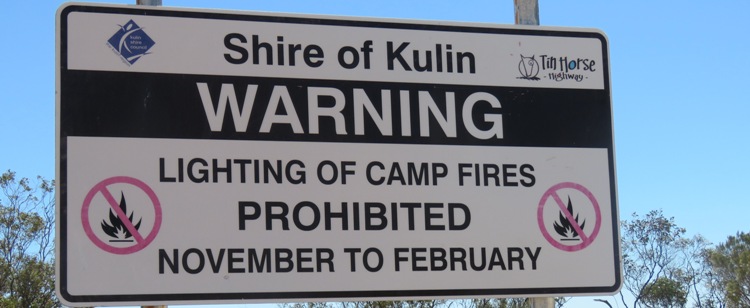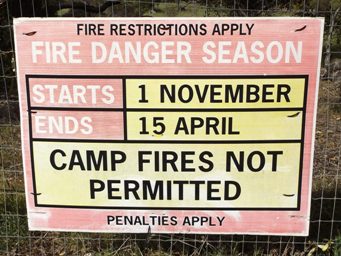Australia So Much to See


A suitable type and size of fire extinguisher should be carried in both the caravan and the tow vehicle. They should be placed in an easy to reach site. Ensure that they are replaced or serviced by their due date.
You car or caravan fire
extinguisher should be suitable for use on all classes of fire. Contents should be human safe and ozone free (nitrogen propellant). Small extinguishers as kept in cars only have a few seconds of activated use so are only useful for fires in the initial stages and
when safe to reach the point of the fire.
When trip planning, all travelling with you should be shown where the fire extinguishers are and how to use them. If you are travelling in a caravan, you will most likely have only one exit. Discuss with family which window would be the safest
to exit through should anyone become trapped by a fire near the door. See Caravan Fire Safety.
If a fire
occurs, consider your safety and that of your family before trying to save your property. Evacuate all member of your family
or touring party to a safe location at a sufficient distance should a gas bottle explode. Ensure everyone is present. If practical,
telephone emergency services 000. Should the fire occur when you are on the road, have someone flag down traffic approaching
in both directions.
Before fighting the fire, particularly with water or wet extinguishers, disconnect all electricity,
although depending on where the fire is you may not be able to disconnect the batteries or reach isolation switches inside your caravan
or camper. Turn off gas bottles. If the fire is in your car, disconnect the battery/batteries only if safe to do so and
if lifting the bonnet will not exacerbate the fire.
Alternatives which have proved valuable in saving vehicles include a carton of beer cans (saved our car once) and a five litre pump up to pressure garden sprayer (these can also double as a bush shower).
An excellent article on fire extinguishers Caravan & Motorhome Fire Safety: Australian Guide. The also shows a type
of extinguisher for Lithium batteries, which are being more extensively used in caravans and motorhomes. Note the point
"Remember once a vehicle is ablaze, it really doesn't matter what caused it. If your caravan or motorhome is on fire, get out fast
and get as far away from the vehicle as possible."
Have a fire alarm in your caravan and ensure it is in working order with good batteries. They get checked every time you make toast! See more about types of fire alarms, including for those with hearing loss on the next page.
A fire blanket is good for something like a frying pan fire. Turn off the gas or electric
element before using. Keep it over the pan until well after you are sure the flames are fully extinguished. Replace blanket
after being used for a fire; they are quite cheap to buy.
If filling a jerry can with petrol at a service station, always
place it on the ground. Fires have occurred. Do not fill a petrol generator while it is still running. Many do,
but there is still a risk.
Maintenance – ensure your electrical systems and gas lines are well maintained with no signs
of wear. If you have a gas fridge, be especially careful of maintenance of both the fridge and other gas and electrical lines.
Have
a Grab Bag in an easy to reach position in your car. This can hold your satellite phone, copies of important documents and credit
card numbers, and a list of emergency phone numbers, and perhaps a USB drive with your most recent photos and important documents
(since last time a back up was posted to your home base or to your family).
Much of
Many
National Park camp grounds do not permit camp fires, although some do in provided fire places. Rules on gathering of wood may
vary from no wood collection being permitted in a national park (to preserve wildlife habitats), to no wood being permitted to be
brought in to the park from outside (due to disease control). Parks in the
Throughout agricultural areas fires, including
campfires, will be prohibited during the dry months, and on high risk days. Sometimes total movement of vehicles off
road will be banned. These periods and total ban days are set locally and will differ in every Shire.
For more information about fire safety, bushfire alerts and prohibited burning times in each state:
Western Australia
South Australia
Victoria
Tasmania
New South Wales
Australian Capital Territory Alerts Total Fire Bans Barbecues
Queensland
Northern Territory
Always ensure that the coals are completely extinguished before leveling the ground. Once when camped on sand at a beach, I started to tread on sand just outside the caravan door but it seemed hot so I quickly withdrew my foot. Several buckets of water steamed from the heat bed until it was entirely extinguished. The campers from the previous day would have thought they had done the right thing by burying the coals under a thick layer of sand expecting them to be extinguished. I was lucky I realised the danger in time to avoid suffering burns.
Forest Fire Management Victoria have a short video on Campfire Safety and
a section to read on Safe Campfires.
Fire extinguishers in vehicles and emergency substitutes. Campfire safety, and when fire restrictions prevent lighting of campfires.


While writing this, I was interrupted by a bushfire close to home. This most likely occurred from a winter burn off. A
fire can remain smouldering underground undetected until adverse conditions may occur months later. A number of devastating
rural fires have started this way, as have wildfires from buried but not fully extinguished campfire coals.
We
choose not to light camp fires. We carry a gas camp stove for cooking out of doors and when camping away from the caravan.